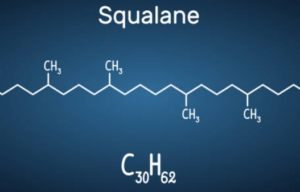Ethics vs. Efficacy

In the realm of skincare and cosmetics, ingredients play a pivotal role in determining the effectiveness of a product. Shark squalene, derived from the livers of deep-sea sharks, has been a longstanding ingredient in the beauty industry, renowned for its moisturizing and skin-nourishing properties. However, the ethical implications surrounding the use of shark squalene have sparked significant debates in recent years. In this comprehensive exploration, we will delve into the ethical concerns associated with shark squalene, evaluate its efficacy, and discuss sustainable alternatives that align with the growing demand for ethical beauty practices.
- Historical Significance in Traditional Medicine: Shark squalene has a rich historical significance deeply rooted in traditional medicine practices. Various cultures, particularly those with coastal communities, have revered sharks for their medicinal properties. The liver, rich in squalene, was often extracted and utilized in traditional remedies for ailments ranging from skin conditions to respiratory issues.
- Cultural Practices and Beliefs: The use of shark-derived ingredients in traditional skincare and medicinal practices is intricately tied to cultural beliefs. For centuries, communities have viewed sharks as powerful and resilient creatures, and incorporating shark-derived substances into beauty rituals was seen as harnessing the strength and vitality of these majestic marine beings.
- Harvesting Methods: Traditional harvesting of shark squalene involved a labor-intensive process. Fishermen would catch sharks primarily for their liver, where the squalene is concentrated. This process, often characterized by its inefficiency, contributed to the mystique surrounding shark-derived skincare ingredients.
- Limited Availability and Rarity: The labor-intensive and environmentally impactful nature of traditional harvesting methods resulted in shark squalene being considered a rare and precious ingredient. Its limited availability contributed to its exclusivity in skincare formulations, adding to its allure in the cosmetics industry.
Ethical Concerns: The Dark Side of Shark Squalene
- Impact on Shark Populations: The harvesting of shark squalene has been a major contributor to the decline in shark populations worldwide. Overfishing, driven by the demand for shark livers, has led to a severe imbalance in marine ecosystems. Sharks, as apex predators, play a crucial role in maintaining the health and balance of oceanic ecosystems, and their depletion can have cascading effects on marine biodiversity.
- Unsustainable Practices: Traditional methods of obtaining shark squalene involve practices that are inherently unsustainable. The indiscriminate catching of sharks solely for their liver oil disrupts the delicate balance of marine life. Sharks are often caught in large numbers, leading to a depletion of certain species and, in some cases, contributing to the endangerment of specific shark populations.
- Environmental Impact: Beyond the direct impact on shark populations, the process of harvesting shark squalene poses environmental challenges. It contributes to the broader issue of overfishing, habitat degradation, and the disruption of marine ecosystems. The environmental consequences of extracting shark squalene extend far beyond the cosmetic industry, affecting the health of our oceans.
- Lack of Regulation: One of the significant ethical concerns surrounding shark squalene is the lack of stringent regulations within the cosmetics industry. The absence of clear labeling and standardized sourcing practices makes it challenging for consumers to make informed choices. The lack of transparency allows for the continuation of unsustainable practices without accountability.
- Ecotourism Impact: Some regions heavily rely on sharks for ecotourism, where divers and tourists pay to experience the presence of these majestic creatures. The depletion of shark populations due to squalene harvesting not only impacts the environment but also affects the livelihoods of those dependent on shark-related tourism.
- Bycatch and Wasteful Practices: The methods used in shark squalene harvesting often result in bycatch, the unintended capture of non-target species. This bycatch may include vulnerable marine life such as sea turtles, dolphins, and other sharks. Wasteful practices associated with shark squalene extraction contribute to broader concerns about responsible and ethical fishing.
- Animal Welfare Considerations: The process of extracting shark squalene raises concerns about animal welfare. The harvesting of sharks for their liver oil is often done in ways that subject the animals to stress, injury, and inhumane treatment. These practices conflict with evolving societal values that emphasize ethical treatment of animals.

Efficacy of Shark Squalene: Is it Worth the Cost?
- Moisturizing Properties: Shark squalene has gained acclaim for its exceptional moisturizing properties. The molecular structure of squalene closely resembles the skin’s natural lipids, allowing it to penetrate deeply and provide intense hydration. This makes shark squalene a sought-after ingredient in skincare products, especially moisturizers and hydrating serums.
- Skin Compatibility: One of the reasons for the popularity of shark squalene in cosmetics is its compatibility with various skin types. It is often touted as non-comedogenic, meaning it is less likely to clog pores, making it suitable for those with oily or acne-prone skin. The lightweight texture of shark squalene allows for easy absorption, leaving the skin feeling nourished without a greasy residue.
- Antioxidant Benefits: Beyond its moisturizing properties, shark squalene is rich in antioxidants. Antioxidants play a crucial role in neutralizing free radicals, which are unstable molecules that contribute to premature aging and skin damage. The inclusion of shark squalene in skincare formulations is believed to contribute to anti-aging benefits by combating oxidative stress.
- Texture and Absorption: The texture of shark squalene is often lauded for its elegance and smoothness. It imparts a luxurious feel to skincare products, enhancing the overall sensory experience. The quick absorption of shark squalene into the skin contributes to its popularity in cosmetic formulations, leaving a silky, non-greasy finish.
- Squalene vs. Squalane: Squalene, the natural form found in shark liver oil, is prone to oxidation, which can compromise its efficacy and lead to an unpleasant odor. To address this, squalene is hydrogenated to produce squalane, a more stable form. Both forms are used in cosmetics, but the hydrogenation process raises questions about the necessity of sourcing from sharks when plant-derived alternatives are available.
- Traditional Use and Historical Significance: The historical use of shark squalene in traditional skincare practices contributes to its perceived efficacy. For centuries, communities around the world have utilized shark liver oil for its purported benefits, passing down its use through generations. This historical significance adds to the mystique surrounding shark squalene’s efficacy in contemporary cosmetic applications.

Sustainable Alternatives: Paving the Way for Ethical Beauty
- Plant-Derived Squalane: One of the most prominent and ethical alternatives to shark squalene is plant-derived squalane. Squalane can be sourced from various plant-based oils, with olive oil and sugarcane being common options. The process of extracting squalane from these plants eliminates the need for shark harvesting, making it a sustainable and cruelty-free choice.
- Olive Squalane: Extracted from olives, olive squalane shares a structural similarity with shark squalene. It provides the same moisturizing and skin-nourishing benefits without contributing to the environmental impact associated with shark harvesting. Olive squalane has gained popularity as a sustainable alternative in the cosmetics industry.
- Sugarcane Squalane: Another ethical alternative is squalane derived from sugarcane. This plant-based source is not only sustainable but also environmentally friendly. Sugarcane squalane addresses the growing demand for cruelty-free and eco-conscious beauty products, offering a renewable resource for squalane extraction.
- Biosynthesized Squalane: Advancements in biotechnology have paved the way for biosynthesized squalane. This innovative approach involves fermenting plant sugars to produce squalane, eliminating the need for any plant extraction. Biosynthesized squalane represents a cruelty-free and sustainable option that aligns with evolving ethical standards in the beauty industry.
- Fermentation Process: The fermentation process used in biosynthesized squalane production involves microbial cultures breaking down plant sugars to create squalane. This method is not only efficient but also significantly reduces the environmental impact associated with traditional extraction methods.
- Algae-Derived Squalane: Algae-derived squalane is emerging as another sustainable alternative. Algae, being a fast-growing and renewable resource, offers a cruelty-free and environmentally friendly option for obtaining squalane. This alternative aligns with the industry’s shift towards responsible and ethical sourcing practices.
- Cultivation Practices: Algae cultivation for squalane production involves growing algae in controlled environments. This method allows for a continuous and sustainable supply of squalane without impacting natural ecosystems. Algae-derived squalane represents a forward-thinking approach to ethical beauty practices.
- Consumer Awareness and Demand: The shift towards sustainable alternatives is driven by increasing consumer awareness and demand for ethically sourced products. As consumers become more conscious of the environmental and ethical implications of skincare ingredients, there is a growing preference for brands that prioritize sustainable and cruelty-free alternatives.
- Informed Choices: Brands that transparently communicate their commitment to sustainability and ethical practices resonate with consumers seeking to make informed choices. This has led to a paradigm shift in the beauty industry, with many brands actively seeking and promoting sustainable alternatives to traditional, less ethical ingredients.
- Industry Initiatives and Certifications: Recognizing the need for sustainable practices, industry initiatives and certifications have been established to guide brands in adopting ethical sourcing methods. Certifications such as cruelty-free, vegan, and eco-friendly labels help consumers identify products aligned with their values and encourage the industry to adopt more responsible practices.
- The Role of Certification Bodies: Organizations such as Cruelty-Free International and The Vegan Society play a vital role in certifying products that meet specific ethical standards. These certifications not only assure consumers but also encourage brands to prioritize sustainable alternatives in their formulations.
- Collaborations and Research: Collaborations between beauty brands, research institutions, and environmental organizations contribute to the development of sustainable alternatives. Ongoing research focuses on improving extraction methods, finding new plant sources, and enhancing the overall sustainability of beauty product ingredients.
- Shared Responsibility: The beauty industry’s transition towards sustainable alternatives is a shared responsibility involving brands, consumers, and research institutions. By working together, stakeholders can accelerate the shift towards ethical beauty practices that prioritize both efficacy and environmental responsibility.
- Educating Consumers: Education plays a pivotal role in fostering a greater understanding of sustainable alternatives. Beauty brands have the opportunity to educate consumers about the environmental impact of traditional ingredients and showcase the efficacy of ethical alternatives. Informed consumers can drive demand for sustainable choices, influencing the industry’s trajectory.
- Transparency in Ingredient Sourcing: Transparent labeling and communication about ingredient sourcing practices contribute to consumer trust. Brands that openly share information about their commitment to sustainability and ethical sourcing build stronger connections with environmentally conscious consumers.

Navigating Ethical Consumer Choices
- Educating Consumers: The beauty industry plays a crucial role in educating consumers about the ethical implications of ingredient sourcing. Transparent labeling and informative campaigns can empower consumers to make conscious choices aligned with their values.
- Supporting Ethical Brands: Consumers are increasingly seeking out brands that prioritize ethical and sustainable practices. Supporting brands committed to cruelty-free alternatives and transparent sourcing encourages the industry to embrace more responsible practices.
- Advocating for Change: Consumer demand has the power to drive change within the beauty industry. Advocacy for stricter regulations, transparency, and sustainable practices encourages brands to prioritize ethics while delivering effective products.
The debate surrounding shark squalene in cosmetics highlights the intersection of ethics and efficacy in the beauty industry. While shark squalene has proven skincare benefits, the environmental impact and ethical concerns associated with its harvesting raise questions about the industry’s responsibility. As consumers become more conscious of their choices, the demand for sustainable alternatives is reshaping beauty standards. Ethical alternatives, such as plant-derived squalane, present a viable path forward, offering skincare enthusiasts effective products without compromising the well-being of marine ecosystems. In the evolving landscape of beauty, the quest for ethical and efficacious skincare invites us to reconsider traditional practices and embrace a future where beauty aligns seamlessly with ethical responsibility.

